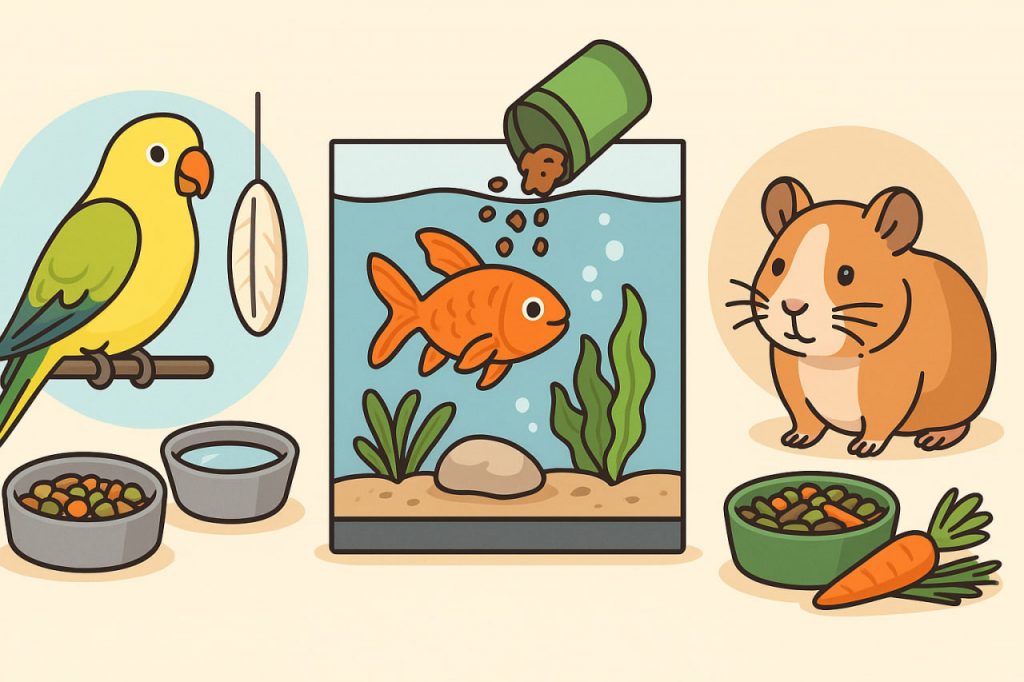Small companion animals like birds, fish, and rodents have unique dietary needs. Unlike dogs and cats, these species often require specialized feeding routines that reflect their natural behavior and metabolism. Improper feeding is one of the most common causes of illness and shortened lifespan in these animals. Knowing how to feed them correctly can significantly improve their health, mood, and longevity.
Feeding Pet Birds
Pet birds include species like budgerigars, cockatiels, parrots, finches, and canaries. Their diets vary, but general guidelines apply:
1. Balanced Diet:
- Seeds and grains should be part of the diet but not the main component. Many pet birds become overweight or nutrient-deficient on seed-only diets.
- Include pellets formulated for the bird’s species — they are nutritionally balanced.
- Offer fresh vegetables like spinach, carrots, bell peppers, and broccoli regularly.
- Occasional fruits like apple slices or banana pieces can be given, but in moderation.
2. Feeding Tips:
- Avoid avocado, chocolate, caffeine, alcohol, and fruit seeds — toxic to birds.
- Provide clean, fresh water daily.
- Use a cuttlebone for calcium and beak maintenance.
3. Foraging:
Birds are natural foragers. Hiding food or using puzzle feeders promotes mental stimulation.
Feeding Aquarium Fish
Different fish species have specific nutritional needs, but general principles apply for home aquariums.
1. Types of Fish Food:
- Flakes and pellets: Staple food, often species-specific (e.g., tropical flakes, goldfish pellets).
- Freeze-dried and frozen foods: Good protein sources (bloodworms, brine shrimp).
- Live food: For carnivorous species, enhances natural behavior.
- Vegetable matter: For herbivorous fish like plecos or mollies (e.g., blanched zucchini).
2. Feeding Tips:
- Feed small amounts 1–2 times per day, only what they can consume in 2 minutes.
- Overfeeding can pollute the water and lead to fish illness.
- Remove uneaten food with a net or siphon.
3. Water Quality:
Poor feeding practices lead to ammonia buildup, harmful to fish. Regular water changes are essential.
Feeding Pet Rodents
Rodents include hamsters, guinea pigs, rats, mice, and gerbils. Each species has unique dietary needs.
1. Hamsters and Mice:
- Commercial rodent mix or pellets as base diet.
- Fresh vegetables like cucumber, carrot, and broccoli.
- Occasional treats like nuts or boiled egg in small amounts.
2. Guinea Pigs:
- Require vitamin C daily (they cannot synthesize it).
- Provide fresh hay (like timothy hay) constantly — essential for digestion and teeth.
- Daily servings of leafy greens (e.g., kale, parsley).
- Avoid iceberg lettuce, which has little nutritional value.
3. Rats and Gerbils:
- Omnivores — enjoy grains, fruits, and occasional proteins.
- Limit sugar and fatty treats.
- Keep water bottles clean and refilled.
Common Feeding Mistakes
- Overfeeding or underfeeding
- Lack of dietary variety
- Feeding human food not meant for animals
- Ignoring species-specific needs
- Dirty food and water containers
Tips for All Small Animal Owners
- Always research the specific dietary requirements of your species.
- Ensure clean, fresh water is available at all times.
- Introduce new foods gradually to avoid digestive issues.
- Observe for signs of nutritional deficiencies: dull fur or feathers, lethargy, weight changes.
- Consult a veterinarian with experience in exotic or small animals when in doubt.
Glossary
- Pellets: Compressed food designed to provide balanced nutrition
- Foraging: Natural behavior of searching for food
- Cuttlebone: A calcium-rich supplement for birds
- Ammonia: A toxic byproduct of decomposing fish waste and food
- Timothy hay: A high-fiber grass hay essential for guinea pigs and rabbits


